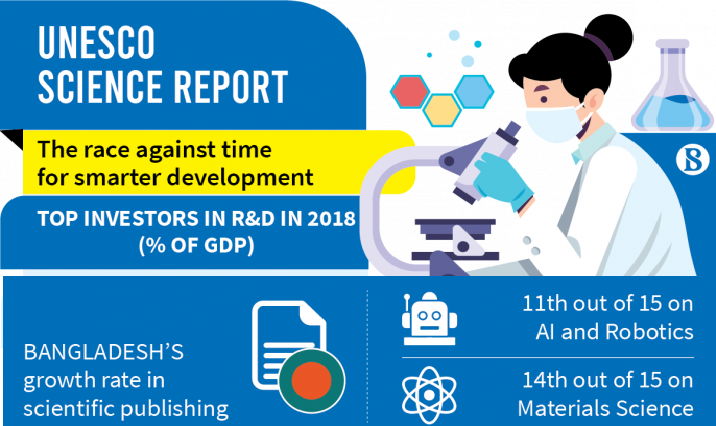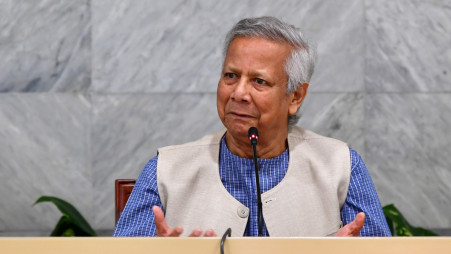A recent "Science Report" published by the United Nations Educational, Scientific and Cultural Organisation showed that 80% of the countries invested less than 1% of GDP in research and development from 2014 to 2018.
Such underspending on R&D means these countries are mostly a recipient of foreign scientific expertise and technology, says the 2021 edition of Science Report titled "The Race against Time for Smarter Development."
The report sheds light on countries' experiences embarking on both digital and green transitions to achieve the SDGs (sustainable development goals), and added that the Covid-19 pandemic has further emphasised the importance of scientific research.
Spending on science increased by 19% worldwide between 2014 and 2018 – with the number of scientists growing by 13.7%, to 8.8 million – and spending has been further boosted by the response to Covid-19 pandemic, says the report.
Unesco collected data from some 193 countries for this study.
G20 countries spending more on research
Nine out of every ten research expenditure, researchers, publications and patents came from G20 countries. Israel and South Korea invests the most in research and development as a share of the GDP of any country in the world.
The report had no expenditure information regarding research and development expenditure for Bangladesh.
For clarification, it mentioned that internationally comparable data are unavailable for some populous countries such as Bangladesh, Brazil, China, India, Nigeria and even the USA.
Bangladesh, Nepal, Pakistan and Sri Lanka all have explicit science, technology and innovation (STI) policies but a lack of adequate instruments is impeding implementation.
Rapid shifts in publishing landscape
The report also counted scientific paper publications, which increased by 21% globally between 2015 and 2019.
In 2019, the European Union (28.6%), China (24.5%) and America (20.5%) were responsible for o three-quarters of global scientific production. Some Asian countries are also on lead after the leaders, such as India (6.1%), Japan (4.5%), Russia (3.7%), Korea (3.1%) etc.
Bangladesh is categorised on the "Not specialised and low impact" by the Science Report regarding specialisation and average of relative citations for cross-cutting strategic technologies.
Bangladesh however ranked 11th out of the top 15 countries when it comes to growth rate in scientific publishing on AI (artificial intelligence) and robotics, with at least 500 publications. The country had 1,892 publications from 2012 to 2019 and its average growth rate was 2.59%.
India is leading in this regard with more than 87,000 publications during the same period. For the publication of "material science," Bangladesh ranked 14th out of 15 with 665 publications from 2012 to 2019.
Trends in research expenditure
Over the past five years, science, technology and innovation have become synonymous with economic competitiveness and modernity. Developing countries seek to diversify their economies and make them more knowledge-intensive.
The most enormous example of this trend is the United Arab Emirate. The UAE almost doubled its research intensity to 1.30% of GDP between 2014 and 2018.
Women a minority in Industry 4.0 fields
Industry 4.0 refers to a new phase in the Industrial Revolution that focuses heavily on interconnectivity, automation, machine learning, and real-time data.
In 2018, women accounted for one in three (33%) researchers in such fields. They have achieved partly in life sciences in many countries and even dominate this field in some cases.
Women remain a minority in technical and leadership roles in tech companies. Less than one in four researchers in the business world is a woman and, when women start up their own business, they struggle to access finance.
In 2019, just 2% of venture capital was directed towards start-ups founded by women.
This report is a sign that research can no longer be considered as a luxury item in national budgets. To accelerate research activities, governments must invest more and more strategically in research by encouraging innovation in the private sector.
Although countries are investing more in green tech, sustainability science is not yet mainstream at the global level, according to a Unesco study.










